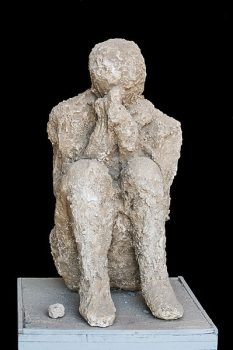Ancient Romans and Toothaches Posted by Brittany Britanniae on Nov 2, 2016 in Roman culture
Salvete Omnes! I hope this new month has been treating you all well. If you celebrated Halloween on October 31st, you might have gotten or been left with some candy. For the rest of the holiday season we are usually bombarded with sweets of all kinds, so let us take a look at how the Ancient Romans dealt with the damage those sweets might have dealt.
The Ancient Romans had some forms of dental hygiene, however it was very simple. And yet, the Ancient Romans had less use for routine dental hygiene. This is because their diet was far different from our own. Whereas we usually need at least one checkup with the dentist a year, the Ancient Romans had very little need for dentists. This is because their diet included very, very little sugar. They did not have the same temptation we deal with around this time of year.

Cast of a sitting victime of the eruption of Mount Vesuvius, 79 CE, Pompeii, Italy. Courtesy of Wikimedia Commons.
When examining the teeth of victims from Pompeii that were preserved in ash from the volcanic eruption of Mt. Vesuvius, scientists found that their teeth were in very good condition. Ancient Romans typically ate fruits and vegetables and had a fiber-rich Mediterranean diet that left their teeth in better condition than our own.
The daily routine of Ancient Romans included brushing their teeth with fibrous twigs that scraped away the surface plaque. They also used powders and pastilles to whiten teeth and freshen their breath. Nitrum, which was either potassium or sodium carbonate, was rubbed on their teeth to restore their color.

Latin Poet Ovid. Courtesy of Wikimedia Commons.
Although they had less need for dentists, white teeth were considered beautiful and desirable whereas black or stained teeth were considered unattractive. In an excerpt written by Ovid, he warned, “You can do yourself untold damage when you laugh if your teeth are black, too long or irregular.” He, instead, recommended that people with black teeth show off their dimples when they smile.

Plantago Major. Courtesy of Wikimedia Commons.
Beyond this, there was very little recorded about dentistry in Ancient Rome. Pliny recommended plantago to help with toothaches. There have been references to false teeth, made from bone, ivory, and paste. There was also mentioning, in the Twelve Tables of Roman Law, that anyone “with teeth fastened together (juncti) with gold” could be exempted from the law that prohibited corpses from being buried with gold. This sheds some light in the abilities of dentists, who might have learned from the Etruscans who had very good dentists.
Sources:
http://www.telegraph.co.uk/news/worldnews/europe/italy/11902097/Ancient-Romans-had-perfect-teeth-thanks-to-healthy-low-sugar-diet.html
“Life in Ancient Rome” Frank Richard Cowell, Penguin, Feb 1, 1976

Build vocabulary, practice pronunciation, and more with Transparent Language Online. Available anytime, anywhere, on any device.
About the Author: Brittany Britanniae
Hello There! Please feel free to ask me anything about Latin Grammar, Syntax, or the Ancient World.




Comments:
Toni Guy:
Very interesting. I read that Romans’ had teeth worn down from eating bread which had tiny rocks left over from the grinding process. Did you find this?